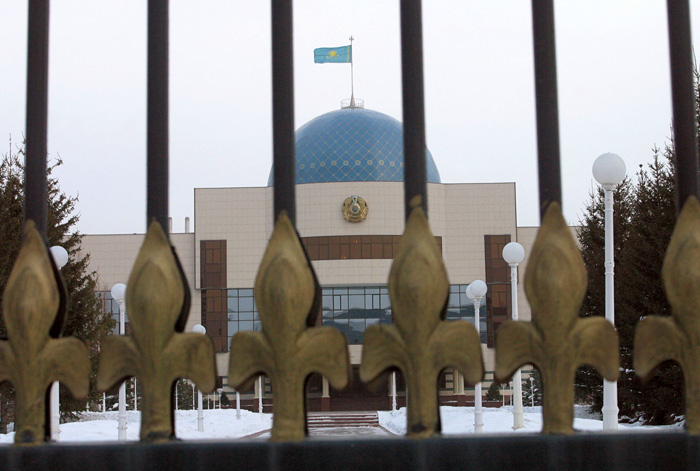
How Moscow Is Playing the Russian Autonomy Card in Kazakhstan
Publication: Eurasia Daily Monitor Volume: 11 Issue: 186
By:

In the world of labor union–business relations, it is commonly understood that, oftentimes, the threat of a strike, as long as it is credible, can achieve more than an actual strike itself. On the one hand, the business against which a strike may be launched can never be sure just what the union will in fact be able to do. And on the other, by avoiding going into the streets, the union does not have to pay as high a price, either in the loss of wages by its members or in public estimation of its role as a responsible social actor.
A similar dynamic can be observed in Vladimir Putin’s efforts to dominate the post-Soviet states by threatening to create what he calls “the Russian world” (“Russkiy mir”). When Moscow has actually employed force to try to achieve its dominance over a neighboring country as in Georgia in 2008 or in Ukraine now, it has succeeded; but such actions have has entailed real costs. However, by establishing its credibility in this area, the Russian government has, like many labor unions, intimidated others. And in the future, Moscow may be able to achieve its goals of bending other governments to its will without actually having to repeat what it has already done elsewhere.
That is an especially attractive option not only because few Western governments will raise any objections to such acts of implied intimidation but also because, if such implicit threats do not work, Moscow always retains the option to engage in more direct action and will even have laid the groundwork for doing so by talking about the need to protect the “Russian world” in this or that country.
At present, Moscow appears to be employing just such a strategy in Kazakhstan, a country with a large ethnic-Russian minority. Many in Moscow are now talking about the need to “protect” ethnic Russians there by making demands for a Russian autonomy in the same way that they earlier made such comments about Ukraine and are also doing in the cases of the Baltic countries and even Belarus. But to date, the Russian government has not felt compelled to move much beyond such talk because it has relatively good relations with President Nursultan Nazarbayev and because raising this issue appears to have made Astana even more willing to cooperate with Moscow than it had been earlier.
Viktor Shatskikh, a Russian journalist who was born in Kazakhstan and lived there until 2000, provides one of the clearest insights into how many in the Russian capital have viewed the Russian issue in Kazakhstan since Soviet times. Furthermore, he discusses why there had been growing concern there about Astana’s nationality policy in recent years and how what he euphemistically labels “the Ukrainian events” have had a sobering and, from Russia’s point of view, positive impact on Kazakhstan’s approach to its Russian minority (svpressa.ru, October 15, 17).
He points out that many Russians, including most prominently the writer Aleksandr Solzhenitsyn, have long argued that the Soviet government made a mistake in giving so much of what they believe to be Russian territory to Kazakhstan. And he reports that in 1992, Russian Deputy Prime Minister Mikhail Poltoranin, who had earlier worked in Kazakhstan, proposed to Russian President Boris Yeltsin and Kazakhstani President Nazarbayev that they work to set up a Russian-dominated autonomy in northeastern Kazakhstan. Poltoranin suggested that this territory be called the Irtysh Republic and include all the territories that Moscow had transferred from the Russian Federation to Kazakhstan after 1917.
As Poltoranin recently told Shatskikh, Nazarbayev, was furious about this idea, and Yeltsin said he was not interested in becoming involved in the ethnic politics of Kazakhstan or other “new independent states.” The Russian president pointedly asked “why do we need another Sevastopol?” The idea was quickly dropped. For the next decade, largely because the ethnic-Russian community in Kazakhstan remained large and the Kazakhs did not challenge its language rights—indeed, many Kazakhs, Shatskikh points out, spoke Russian better than their national language—the situation there remained relatively calm.
But over time, the situation changed, the Russian journalist claims. As a result of Russian flight—more than two million ethnic Russians have left Kazakhstan—and differences in growth rates, the demographic balance that had existed between Russians and Kazakhs in Kazakhstan collapsed. Instead of being two roughly equal communities, as in Soviet times, the ethnic Kazakhs now outnumber the ethnic Russians two to one. According to Shatskikh, that led Astana to be increasingly insensitive to Russian needs: it moved to drive out Russian from many contexts and it stopped ensuring an ethnic balance in the appointment of state officials. And in turn, that opened the way, Shatskikh says, for some Kazakhs to start blaming Russians for any and all problems.
Then Ukraine happened: first, the Maidan, which reminded Nazarbayev that his position was not unassailable, and then the Russian intervention in Crimea and Donbas, which showed that Moscow could reopen the Russian autonomy issue elsewhere as well. As a result, Nazarbayev has backed down on the language issue and has even begun promoting more Russians to positions of responsibility. In short, Moscow is apparently achieving what it wants at a low cost by threatening, but not yet playing, the “Russian card” in Kazakhstan.




